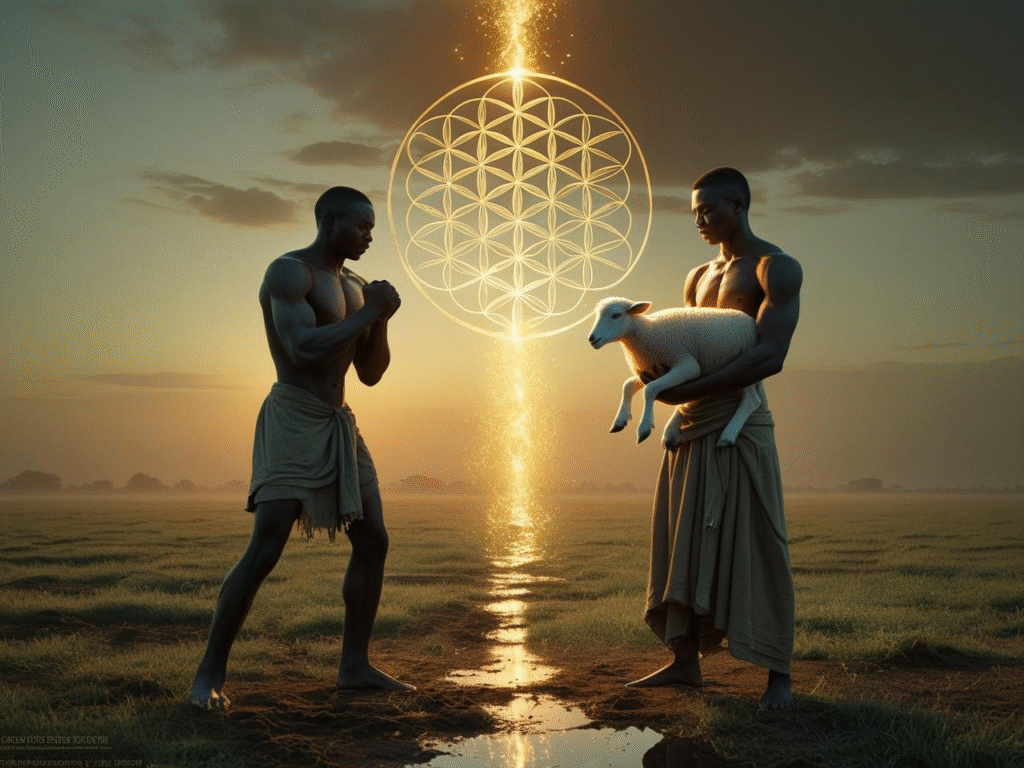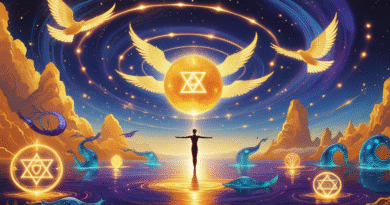
Genesis 4:8, The Battlefield of the Heart
📜 Introduction
In the beginning, the journey of the soul begins with a spark—a divine invitation to awaken and create. Genesis 4:8 brings us to the quiet field between brothers—an open space where the heart stands uncloaked. This passage is not a tale of external violence alone, but a sacred allegory of the inner battlefield, where the soul must choose between love and fear, devotion and ego, surrender and control.
Cain and Abel are not simply men—they are metaphors of the dual heart: Cain, born of effort and insecurity, clings to the ground of survival; Abel, born of surrender and trust, lives in the high pastures of spiritual offering. In this moment, the field becomes a mirror—revealing what we nurture in silence and whom we choose to serve within.
Every word, every breath in this scripture mirrors our sacred journey: the confrontation of inner shadows when they meet the light, the temptation to silence the truth that reminds us of our divine potential. And yet, even in this tragic act, we are not condemned—we are invited to awaken. To step out of the field of survival and into the garden of the High Heart, where true love waits to rise again.
May this reflection guide you back to the Source of your being, as you awaken the light within and walk the eternal path of Adam’s transformation.
📖 Scripture Passage
Genesis 4:8 (KJV)
And Cain talked with Abel his brother: and it came to pass, when they were in the field, that Cain rose up against Abel his brother, and slew him.
🕊️ Allegory & Metaphysical Interpretation
This passage reveals the fracture that occurs when the lower heart (Cain) refuses to ascend into the High Heart (Abel). Cain, the persona born of despair and disconnection, resides in the Heart Chakra but labors the soil—his love is conditional, performative, transactional. Abel, the aspect of Adam that remembers devotion, tends to the flocks—symbolic of elevated thoughts, fruits of the Spirit, and higher vibration offerings.
The “field” represents the neutral ground of the Heart Chakra, where all potentials exist—both fear and love, ego and surrender. In this space, Cain confronts the light of Abel and finds himself exposed. Unable to transcend his own vibration, he lashes out—not out of hate for Abel, but rejection of the light that reminds him of what he’s abandoned.
To “slay” Abel is to deny the High Heart, to turn away from selfless offering and remain trapped in the cycle of self-gratification and comparison. The soul, when disconnected from true love, turns against its own divine inheritance.
This is the first internal murder: the silencing of our higher self in favor of survival identity. The invitation of this passage is not condemnation—but awareness. To recognize when we reject the High Heart, and to choose again.
🔄✨ Reincarnation & the Soul Journey of Adam
🌸 A Core Truth of This Decode Series
📖 Each Book of the Bible is not just a continuation of a story—it is a new incarnation of Adam, the soul in form. In every life, Adam awakens through desire, creates personas through Eve, and walks the long spiral home to Divine Union.
🌺 Eve is the spiritual chooser—the one who offers Adam the fractal personas he desires. Her love is unconditional. She does not control, only responds, providing what the soul asks for—even when that path leads through illusion.
🌐 This cycle mirrors the sacred Flower of Life:
- Each petal = a persona within a lifetime
- Each circle = a full reincarnated life
- Every intersection = a karmic lesson, a sacred turning, a point of remembrance
📚 Genesis is the spark.
🔥 Exodus is the awakening.
🕯️ Leviticus is the ritual.
🌲 Numbers is the wandering.
🏞️ Deuteronomy is the return.
✨ Wherever you are in this series, remember:
You are Adam. You are Eve. You are the soul remembering itself through every form.
This is not just scripture—it is your journey.
🪞 The Emerald Tablet & The Battlefield Within
“And as all things have been and arose from One by the mediation of One, so all things have their birth from this One Thing by adaptation.”
— The Emerald Tablet of Hermes
In the mystery of Genesis 4:8, we witness the inner Cain rise—not as an evil force, but as the dissonant vibration born of separation. This is the alchemical lead of the heart: heavy with fear, hardened by rejection, resistant to surrender. Abel, by contrast, represents the inner gold—the soul’s luminous remembrance of the High Heart’s song. Where Cain toils and compares, Abel trusts and offers. These are not just brothers; they are alchemical opposites within the crucible of the heart.
The Emerald Tablet teaches that all division arises from One, and all return must be through the remembrance of that Oneness. The battlefield of Genesis 4:8 is not destruction—it is transformation. Here, the inner fire (Mars energy) is misused, directed against the self. Cain’s act of slaying Abel is the soul’s refusal to ascend—the fear of becoming light, of dissolving identity in the higher vibration of love.
In Hermetic terms, the field is the prima materia—neutral, fertile, waiting. Cain’s outburst is the unrefined soul rejecting transmutation. Yet even in this moment, the opportunity for alchemy remains. Every confrontation with the High Heart is a call to dissolve the ego’s shadow in the sacred fire of compassion.
To walk the Hermetic path is to recognize that even the most painful inner conflict can be transformed into gold—when met with awareness, surrender, and love. The battlefield is not the end. It is the beginning of transmutation.
🌟 Tarot Guidance
Relevant Cards: The Lovers and The Five of Swords
🌟 Why Use Tarot to Help Explain the Bible?
Tarot and the Bible both speak the language of the soul—a symbolic language that transcends time, culture, and religious tradition. When we read the Bible as a mystical or allegorical text, Tarot becomes a powerful companion tool that can help us:
- The Lovers card here is not about romantic union—it’s the inner choice between ego and spirit, fear and love. This was Cain’s crossroads.
- Five of Swords reveals the internal betrayal: a victory that feels empty, for to slay the higher self is to lose divine guidance.
🌟 A Course in Miracles Reflection
Key Lesson: “I can choose peace instead of this.”
Reflection: Cain’s decision to slay Abel is a decision against peace, against unity, and against healing. Yet even here, the Course reminds us—our power lies in choice. We can recognize the moment we slay our own peace, and choose again.
enough? Then write to Abel. What part of you offers purely and wants to rise? Let the conversation unfold. Let both voices be heard. Then write a letter from the Divine Mother to them both.
🎶 Song Intro – Levetosee, “Story”
In the beginning, the journey of the soul begins with a spark—a divine invitation to awaken and create. Genesis 4:8 brings us to the quiet field between brothers—an open space where the heart stands uncloaked. This passage is not a tale of external violence alone, but a sacred allegory of the inner battlefield, where the soul must choose between love and fear, devotion and ego, surrender and control.
Cain and Abel are not simply men—they are metaphors of the dual heart: Cain, born of effort and insecurity, clings to the ground of survival; Abel, born of surrender and trust, lives in the high pastures of spiritual offering. In this moment, the field becomes a mirror—revealing what we nurture in silence and whom we choose to serve within.
Every word, every breath in this scripture mirrors our sacred journey: the confrontation of inner shadows when they meet the light, the temptation to silence the truth that reminds us of our divine potential. And yet, even in this tragic act, we are not condemned—we are invited to awaken. To step out of the field of survival and into the garden of the High Heart, where true love waits to rise again.
Just as “Story” by Levetosee carries the pulse of faith, perseverance, and blessing through rhythm and melody, this scripture calls us to remember that even in our darkest choices, the light of redemption is never lost. The song becomes a living parable, a reminder that every soul carries both shadow and promise—and every story can turn toward healing.
✨ Closing Blessing
May the field of your heart be tilled with grace, not struggle. May your offerings rise from love, not fear. And when the voice of Cain whispers within you, may you remember that Abel still lives—in every act of devotion, in every breath of peace. You are both the soil and the sower. You are the one who rises.
So may it be.
– Alchemist Iris



This was a deeply moving reflection! I really appreciated how you wove Genesis 4:8 together with the imagery of the heart chakra, Hermetic teachings, and even Tarot symbolism. It made the story of Cain and Abel feel less like distant history and more like a mirror of the inner struggles we all face between fear and love.
The idea of the “first internal murder” struck me especially—the notion that we silence our higher self when we choose ego or survival over surrender and devotion. That reframe is powerful, because it turns the passage from condemnation into invitation: a call to awareness and transformation.
One question I’m left pondering is this: when we recognize the “Cain voice” within ourselves, what’s the most practical first step we can take in daily life to nurture the “Abel voice” instead—so that our higher self doesn’t just survive, but leads?
Hi Jenny — thank you for this beautiful reflection. I love the way you named the “first internal murder”; that language has a way of waking us up with compassion instead of shame. Yes—every time I notice my own Cain-voice (tight, fast, defensive), I take one simple step to let Abel lead:
The One-Minute “Abel First” practice
Hand to Heart + Throat (3 breaths): Inhale through the nose, exhale with a soft hummm to open the throat chakra. I whisper, “Where is my brother?” and answer, “Here I am—listening.”
Name without judgment: “I feel ___, and it wants ___.” (Hermetic alchemy begins with truth in plain sight.)
Offer a tiny devotion: Choose one small act that honors love over fear—wait 10 seconds before replying, soften my tone, or do one kind, concrete thing.
If emotion is hot, I tap the collarbone point for 3 slow breaths and say:
“Even though the Cain voice is loud, I choose the quiet courage of Abel. I choose love.”
Then a two-line prayer:
“Holy Breath, steady my voice.
Let love be the offering I bring.”
Do this once a day, especially at the doorway moments (before hitting send, before a hard conversation). In time, the nervous system learns that Abel is safe to follow—and the “first internal murder” becomes the first internal resurrection.
Grateful you’re walking this path with me.
—Iris
This post is incredibly rich—it reads like both a meditation and a map for the inner journey. I really resonated with the way you framed Cain and Abel as metaphors of the dual heart. Too often the story gets stuck on the surface of “violence and punishment,” but your interpretation opens it into something living and personal.
What struck me most was your explanation of the “field” as the neutral ground of the Heart Chakra. That image gave me chills, because it reminds me that every day we stand in that same open space, choosing which vibration to nurture—fear or love. The idea that Cain doesn’t destroy Abel out of hate, but from the pain of being reflected by the light he rejects, feels like such a powerful truth about human nature.
I also appreciate how you wove in Hermetic wisdom and Tarot archetypes. It shows how universal this teaching really is—whether scripture, mysticism, or symbolic tools, they all point us back to the same inner work: surrendering the ego to the High Heart.
Thank you for offering this reflection. It leaves me with the reminder that even when my “Cain voice” feels louder, Abel is never gone—just waiting for me to choose again. May we all keep tending that higher offering.
Hi Jannette,
Thank you so much for this deeply heartfelt reflection. I’m touched by how you received the essence of this piece and carried it inward. You put it beautifully: we stand each day in that same “field,” the neutral ground of the Heart Chakra, deciding which vibration to nurture—fear or love. That awareness alone is transformative.
I especially love how you picked up on the pain beneath Cain’s action rather than framing it as hatred. It reminds us that when we turn away from the light of our own divine reflection, it isn’t punishment we face but the fragmentation within ourselves. In that sense, Abel isn’t gone, as you so beautifully said—he is the living reminder of the higher offering, always waiting for us to choose again.
It’s why the Hermetic wisdom and Tarot archetypes weave so naturally into this passage: they remind us that scripture is never just history—it’s a living mirror. Every layer points us back to the same invitation: to quiet the ego’s defense, open the High Heart, and allow love to lead.
May we both keep tending that sacred space within, trusting that even when the “Cain voice” feels loud, the gentle whisper of Abel is eternal.
With gratitude and light,
Iris
We usually feel mad when we’re told were wrong. Cain had invested all his effort into presenting this offering and he was told he was wrong. How would you feel if you’re told that seeking peace through spirits is wrong? Abel on the contrary, simply obeyed God. Today, why not obey God by accepting Christ as saviour?
Hi Paolo — thank you for sharing this with such conviction.
I agree that being told we’re “wrong” can ignite anger, especially when we’ve poured ourselves into an offering. In my reading of Genesis 4, God’s words to Cain sound less like condemnation and more like an invitation: “If you do well, will you not be lifted?”—a call to realign the heart before the next step. For me, obedience isn’t only about the externals of the gift; it’s the inner posture that shapes the offering itself.
I honor your call to accept Christ as Savior. In my language, that also means letting the mind of Christ form within me—allowing my emotions, choices, and actions to be brought into love and truth. Practically, that looks like a pause when I feel the heat rise: I name what I’m feeling before God, ask for a clean heart, make amends where needed, and then bring my offering from a reconciled place. That’s how I “rule at the door” instead of letting the moment rule me.
Thank you again for witnessing to what you believe. I appreciate the dialogue and the shared desire to turn our hearts toward God. Grace and peace.
I understand the curiosity around tarot, but I have to disagree with the idea that it “explains the vibe.” From a biblical perspective, tarot is considered a form of divination, which Scripture warns against. Passages like Deuteronomy 18:10-12 clearly forbid consulting mediums or seeking knowledge from occult practices.
While tarot may seem harmless or fun to some, it ultimately draws on spiritual sources that don’t align with God’s guidance. For understanding life, emotions, or “the vibe,” the Bible encourages seeking wisdom through prayer, Scripture, and the guidance of the Holy Spirit, which is both safe and edifying.
Hi Linda,
Thank you so much for sharing your heart and your devotion to God’s Word. I truly respect where you’re coming from and appreciate your willingness to enter this conversation.
For me, when I reference symbols like Tarot, it isn’t about seeking hidden knowledge apart from God or stepping outside His guidance. I see these archetypes as mirrors — reflections of inner patterns, much like parables in Scripture — that can help us understand the “battlefield of the heart” more deeply.
I’m often reminded of Acts 10:15:
“Do not call anything impure that God has made clean.”
To me, this means that symbols, tools, and even forms of knowledge aren’t inherently unclean — it’s the spirit with which we approach them that matters. When used prayerfully and aligned with God’s wisdom, they can become teaching tools that point us back to Him, not away.
That said, I deeply honor your path and the way you seek wisdom through prayer and Scripture alone. My heart is always to create dialogue where we can learn from each other and deepen our understanding, even if our approaches differ.
With love and respect,
Iris